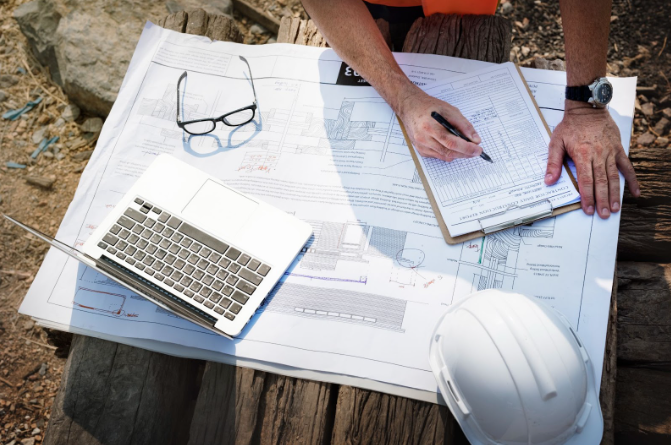The construction market is an emerging market that is growing constantly, with a growth rate of 2.6%. In 2024, this market had a value of $2.12 trillion, and in 2025, its anticipated growth is $2.52 trillion. To achieve a greater ROI in this market, investors need to understand the process of construction management thoroughly.
This blog overviews construction management, key aspects of construction management in New York City, and the construction management process. It also provides you with a reliable and trusted construction management partner.
What is Construction Management?

Construction management is the process of administering and managing construction projects. It involves everything from planning to closing the project. It starts with designing the project plan, budgeting, resource allocation, and ends with quality assurance and inspection.
A construction manager usually handles all aspects of construction management. They ensure that the project is well-planned, effectively carried out, and completed on time. They ensure that all the operations are coordinated smoothly. They remove disparities or difficulties in the process and ensure its success.
Key Aspects of Construction Management in New York City

Construction management in New York City requires navigating strict regulations, tight schedules, and dense urban conditions. Successful construction management ensures projects meet budget, code, and quality expectations. Here are its key aspects:
1. Regulatory Compliance and Permitting
NYC construction projects must comply with zoning laws, building codes, and environmental rules. Construction managers oversee permit applications and ensure all work meets Department of Buildings (DOB) requirements to avoid fines, delays, or legal complications.
2. Budgeting and Cost Control
Accurate project planning NYC and budgeting is critical where labor and material costs are high. Construction managers track expenses, manage contingencies, and prevent cost overruns through detailed financial planning and close collaboration with project stakeholders.
3. Scheduling and Timeline Management
Construction timelines in NYC must account for seasonal weather, local traffic restrictions, and material lead times. Managers use scheduling tools and adjust timelines proactively to keep the project on track and avoid penalties.
4. Contractor and Subcontractor Coordination
Project planning NYC involves multiple specialists working simultaneously. Construction managers coordinate trades, ensure contract compliance, and resolve conflicts quickly to maintain workflow, reduce downtime, and meet project milestones.
5. Site Safety and Risk Management
Safety is paramount in NYC’s dense, vertical job sites. Managers enforce OSHA standards, conduct regular safety audits, and implement risk mitigation strategies to protect workers, pedestrians, and adjacent properties.
6. Quality Assurance and Inspections
High-quality construction requires regular inspections and strict adherence to specs. Managers ensure that workmanship, materials, and installations meet required standards and pass city inspections at each project phase.
Process of Construction Management in New York City

Construction management follows a structured process to ensure safe, efficient, and compliant project execution. From pre-construction planning to final inspections, each stage is carefully managed to meet the city’s regulatory, financial, and operational standards. Here is an overview of the process of construction management in New York City:
1. Pre-Construction Planning
This stage involves defining project goals, creating timelines, estimating costs, and assembling a team. NYC construction managers also assess zoning laws and obtain necessary early approvals to ensure a smooth start to the project.
2. Design Development and Review
Construction managers collaborate with architects and engineers to finalize blueprints and technical drawings. In NYC, this phase must align with building codes and environmental regulations to avoid redesigns or permit rejections later.
3. Permitting and Approvals
Managers oversee the submission of plans to the NYC Department of Buildings and other relevant agencies. Securing permits and ensuring code compliance at this stage prevents costly delays or legal issues during construction.
4. Contractor Selection and Procurement
This phase includes bidding, building contractor NY evaluation, and securing materials and equipment. Construction managers prioritize experienced vendors who understand NYC logistics, site restrictions, and local labor requirements.
5. On-Site Construction and Supervision
Once construction begins, managers supervise daily operations, monitor progress, and address challenges. In NYC, careful coordination of labor and equipment is vital due to limited space, safety concerns, and neighborhood disruptions.
6. Quality Control and Safety Compliance
Construction managers conduct regular inspections, enforce OSHA standards, and manage safety protocols. In New York City, maintaining compliance reduces liability and ensures that buildings pass all required inspections.
7. Final Inspection and Project Closeout
The project concludes with final walkthroughs, documentation, and punch-list resolution. NYC construction managers coordinate with the DOB for final approvals and ensure all warranties, manuals, and legal paperwork are delivered.
Start Your NYC Construction Management with Expert Guidance Today!

Construction management in New York City demands expertise, precision, and deep knowledge of local regulations. From initial planning and budgeting to permits, execution, and final inspections, every phase must be carefully managed to avoid costly delays and ensure project success. Effective communication, building contractor NY coordination, and safety compliance are key to delivering high-quality results in NYC’s complex environment.
Choosing the right construction management partner can make the difference between a seamless build and a stressful experience. That’s where Citadel Property Management Corp. stands out. It offers trusted expertise, local insight, and end-to-end project construction oversight tailored to New York City’s unique construction landscape.
Frequently Asked Questions
1. Why is construction management important in NYC?
NYC has complex regulations, tight spaces, and high costs—construction management ensures smooth, compliant project execution.
2. Who hires a construction manager in New York City?
Property owners, developers, or investors typically hire construction managers to oversee the project.
3. What is the difference between residential and commercial construction management?
Commercial projects are larger, more regulated, and require more complex coordination and approvals.
4. How is construction management different in NYC compared to other cities?
NYC has stricter building codes, denser sites, higher costs, and more complex permit processes.



